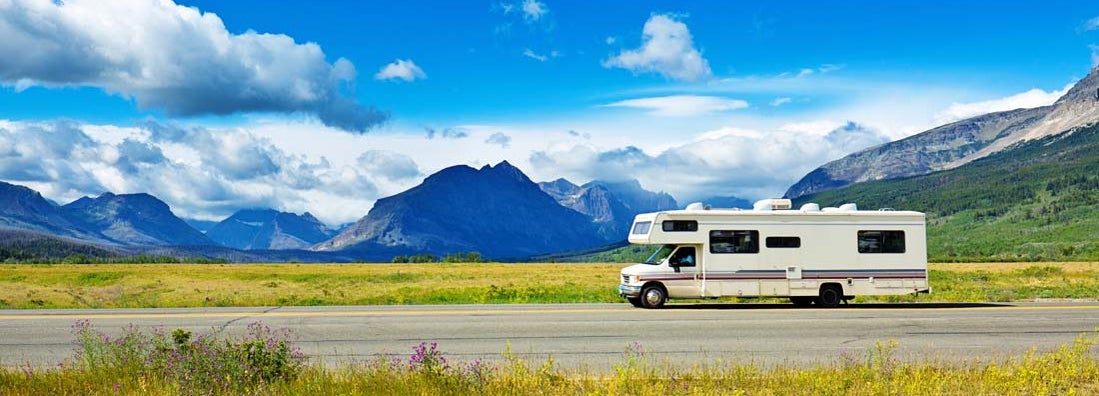RV Insurance in Montana
Experts break down recreational vehicle insurance costs, coverages, companies, and more in Montana.

Jeff Green has held a variety of sales and management roles at life insurance companies, Wall street firms, and distribution organizations over his 40-year career. He was previously Finra 7,24,66 registered and held life insurance licenses in multiple states. He is a graduate of Stony Brook University.

Many residents of Montana enjoy traveling and living in their recreational vehicles. In fact, people in Big Sky Country spend more than $39 million a year on RV sales and service. If you own a recreational vehicle, you can protect your investment and your finances by having a good RV insurance policy.
Local independent agents can gather policies and rates from a variety of top-rated insurance companies in Montana to help you find a good policy at a great price. Find an independent insurance agent near you to get more information and to start comparing customized RV insurance quotes.
How Much Does RV Insurance Cost in Montana?
If you are shopping for RV insurance for the first time, you may be wondering if it is expensive. The answer is: It depends. RV insurance costs can range from a few hundred dollars to a few thousand dollars a year. Your rates will depend on several factors such as:
- Whether the RV is a motorized vehicle or a trailer
- Your RV’s type, class, length, weight, and value
- The estimated value of the personal property in your RV's living quarters
- How often and how far you plan to drive your RV per year
- How much time you plan to spend living in your RV per year
- Your driving record and insurance claims history
- Which, if any, coverage options you are including in your policy
- The size of your deductible
As you may suspect, a luxury Class A motor home will cost a lot more to cover than a towable RV like a camper or a travel trailer. Also, people who live in their RVs full time are likely to spend a lot more for coverage than those who only use their recreational vehicles once or twice a year.
The easiest way to find out how much an RV insurance policy will cost you is by contacting a local independent agent who can provide you with a selection of customized quotes.
Is RV Insurance Required in Montana?
If your RV is a non-motorized towable, like a travel trailer, fifth-wheel, or teardrop camper, you are not required by Montana state law to carry RV insurance. Instead, you can cover it by adding a trailer insurance endorsement to the insurance policy of the vehicle that will be used to tow it.
However, if your RV is self-propelled, like a motor home or camper van, you will be required to cover it with an RV insurance policy that includes liability coverage in amounts that meet or exceed Montana’s minimum coverage requirements.
Additionally, if you have financed your RV and are still making payments, your lender is likely to require you to include coverage against physical damage in your RV insurance policy.
What Kinds of Coverage Can an RV Insurance Policy Provide in Montana?
RV insurance is a mixture of required and optional coverage. A well-built policy can cover your property and finances whether you are using your RV as a home or a vehicle when problems arise.
A minimum-coverage policy for a motorized RV will provide you only with auto liability insurance because it is the only coverage required by law in Montana. RV liability insurance pays for other people’s medical bills and property damage if you are at fault for a collision. Your policy must include at least:
- Bodily injury liability coverage per person: $25,000
- Bodily injury liability coverage per accident: $50,000
- Property damage liability coverage per accident: $20,000
Some RV owners may also be required by their lender to have physical damage coverage. Even if you are no longer paying for your RV and it isn’t required, you can benefit from having this coverage if your RV is on the expensive side. Physical damage insurance pays for loss or damage to your RV. It includes:
- Collision insurance: This covers the cost to repair or replace your RV if it is damaged or totaled in a collision, regardless of fault.
- Comprehensive insurance: This covers the cost to repair or replace RV if it is damaged or totaled by a non-collision hazard like a flood or a tornado.
As you can see, a basic RV insurance policy provides coverage for your RV only when it is being used as a vehicle. However, for many RVers, their vehicle is also their home. That is why insurance companies offer a variety of coverage options you can choose from to build a customized policy.
Some coverage options you may want to consider include:
- Personal liability insurance: Most full-time RVers do not have a permanent residence so they lack the personal liability coverage one would normally get through homeowners or renters insurance. This coverage offers protection If you or someone in your household is unintentionally responsible for harm to others. It can cover:
- Court costs
- Legal defense fees
- Mediation costs
- Settlements
- Judgments
- Vacation liability insurance: Whether you are a part-time or a full-time RVer, this coverage can be beneficial. It supplements the personal liability coverage you already have to give you extra coverage if you are responsible for property damage or injuries while you are staying at an RV park.
- Contents insurance: This is particularly important for full-time RVers since they tend to keep the bulk of their personal possessions in their vehicles. It can cover the cost of repairing or replacing your belongings if they are lost or damaged due to a covered event like a burglary or a severe storm.
- Equipment and accessory coverage: This can cover loss or damage to extra equipment you may have such as satellite dishes, awnings, and other accessories that can make your time living in your RV more pleasurable.
- Storage facility coverage: This can cover any personal belongings you keep in a storage facility while you are enjoying your time traveling around the country.
- Towing and roadside assistance: Most RVs require specialized towing and service if they break down. This can cover the cost of a service call and tow to a nearby garage, which can be expensive, especially if you have to call for help when you are out in the middle of nowhere.
- Umbrella insurance: This is a stand-alone insurance policy that can significantly, yet affordably, boost the liability coverage offered by your RV insurance policy. It is particularly beneficial if you cause a collision while driving your RV, since the larger, heavier vehicle is more likely to cause significant injuries and/or property damage.
It is a good idea to review all offered coverage options and their costs so you can make an informed decision about which optional coverage is a good fit for you and your traveling companions.
What Is RV Gap Insurance in Montana?
If your RV insurance policy includes physical damage coverage and your RV is totaled, your insurance company can reimburse you for your vehicle’s actual assessed value just prior to the damaging incident.
The problem is, for many who have financed the purchase of their RV, the vehicle often depreciates faster than the principal on the loan payment decreases during the first couple of years of making payments.
This is particularly true if you have purchased a very expensive vehicle like a Class A motor home without putting down a substantial down payment.
In this case, if your RV is totaled in the first couple of years, you may end up still owing more for it than your insurance company will reimburse you. RV gap insurance solves this problem by bridging the gap between what you owe and what the vehicle is worth so that your loan can be paid off in full.
Montana Health Insurance for Full-Time RVers
Without good health insurance coverage, an unexpected illness or injury can set you back financially, potentially driving you into bankruptcy.
If you do not currently have healthcare coverage and are looking to buy a policy on the open market, an independent insurance agent can help. These agents can match you up with providers who offer reasonably priced coverage that you can count on no matter where in the US you may be traveling.
If you already have health insurance coverage but you plan to take your RV for an extended trip in Canada or Mexico, an independent agent can help you be certain you will have the coverage you need if you need to seek medical care while you are out of the country.
What are the Best Insurance Companies in Montana
When buying coverage for your RV, you will want to be sure that the policy you are purchasing provides all the coverage you need and that you are getting it at a competitive price. You can do this by requesting quotes from a few different insurance providers and comparing what they have to offer.
Independent insurance agents can save you time and money by doing the comparison shopping for you. These agents have relationships with some of the best RV insurance companies in Montana, so you can be sure that any policies they recommend are offered by insurance providers you can trust.
Why Shop RV Insurance with a Montana Independent Insurance Agent?
No matter what kind of insurance policy you are looking for, an independent insurance agent can help. These experienced agents can explain your coverage options, answer your insurance-related questions, and provide you with a variety of customized quotes that you can review and compare together.
Discover the many benefits of having a local insurance professional on your side. With agents located all over the US, it should be easy to find an independent insurance agent close by no matter where your adventures in a recreational vehicle take you.
https://www.titlemax.com/discovery-center/planes-trains-and-automobiles/which-u-s-states-spend-the-most-on-rvs-per-capita/
https://dojmt.gov/driving/insurance-and-verification/
